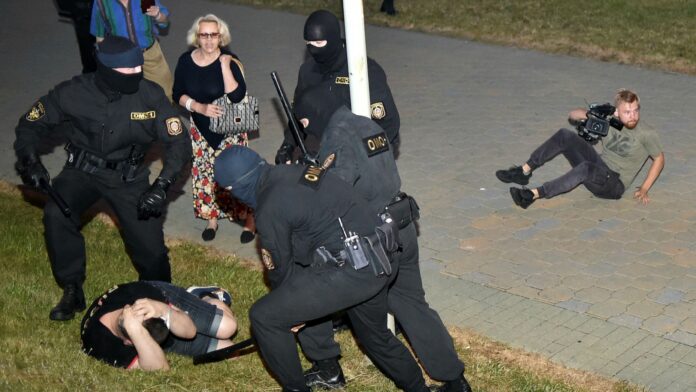The UK is drawing up “Magnitsky”-style human rights sanctions against officials in Belarus responsible for administering the rigged re-election of president Alexander Lukashenko or directing the violent suppression of subsequent street protests.
The foreign secretary, Dominic Raab, said on Thursday that he will introduce the sanctions in conjunction with the US and Canada, reiterating that Lukashenko’s election on 9 August could not be regarded as legitimate.
Efforts by the European Union to impose sanctions have been held up by Cyprus’s refusal to endorse the move unless sanctions are imposed on Turkey in a separate dispute over drilling rights in the east Mediterranean. The delay has been a humiliation to the EU’s efforts to project a coherent foreign policy.
Lukashenko was sworn for a sixth term in office on Wednesday in a ceremony without announcements or publicity – apparently in an effort to avoid it becoming a magnet for protesters. Opposition leaders and European politicians immediately denounced his inauguration as illegitimate.
Raab told MPs: “We do not accept the results of this rigged election. Second, we condemn the thuggery deployed against the Belarussian people.” He said the violence being used by the state was brazen.
He added it is “absolutely critical” that those responsible are held to account, explaining: “We are willing to join the EU in adopting targeted sanctions against those responsible for the violence, the repression and the vote-rigging, although the EU process has now been delayed in Brussels.
Related: Protesters clash with police in Belarus after Lukashenko sworn in again
“Given that delay, given [Lukashenko’s] fraudulent inauguration, I have directed the FCDO [Foreign, Commonwealth and Development Office] sanction team to prepare Magnitsky sanctions for those responsible for the serious human rights violations and we’re co-ordinating with the United States and Canada to prepare appropriate listings as a matter of urgency.”
He also said he was releasing £1.5m cash over two years primarily to help local journalists and civil society in Belarus report on the street protests and its violent repression. The UK has already demanded an Organization for Security and Co-operation in Europe investigation into the ballot rigging that saw British embassy officials blocked from observing an election that Lukashenko claimed he had won with 80% of the vote.
Raab did not say whether the sanctions will hit Lukashenko himself, but the draft EU list covered 20 other officials. Germany has argued lines need to be kept open to the ageing president, but the Lithuanian foreign minister, Linas Linkevičius has personally lobbied Raab in London to include Lukashenko, saying an asset freeze did not preclude holding talks.
Lithuania has become the home for much of the Belarus opposition that has been driven out of their country.
Raab said the relationship between Lukashenko and the Russian president, Vladimir, Putin is nuanced, but warned it was important not to see Belarus driven under Russia’s complete predatory control.
Previous sanctions against Belarus security officials were lifted in 2016.
Raab said he had told Germany and France about the UK’s opposition to Nord Stream gas pipeline from Russia but, so far, Germany’s foreign office has opposed the suspension of its completion, arguing that many contacts have already been signed.







